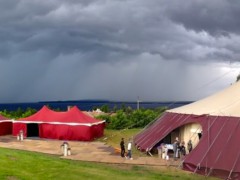Globalization – A Mixture of Data and Personal Stories?

The bottom line reached on Day Two of the Tällberg Forum in Sweden was that if only we could arrive at some kind of agreement about how to define or operationalize globalization, if only we could reach a consensus about its framework conditions and a shared understanding of its opportunities, risks or quite simply of its consequences, this would make the whole theme seem much less overwhelming. At the end of the day we have to ask whether in the light of globalization the whole construct of the national state hasn’t become obsolete.
|
Dark clouds gathering over globalization? |
- Globalization is an economic, social but also political process. Ideally all three dimensions should be considered simultaneously (which doesn’t exactly make analysis any easier even though it gives a better picture of reality).
- Different sets of actors come into play depending on which dimension you choose: are they customers whose customer demands first set the exchange of goods in motion: are they politicians who have always interpreted international politics as an arena of contending spheres of influence; are they companies which – as one speaker insisted – are only interested in freeing themselves of any kind of regulation in order to maximize profits and minimize their tax load?
- Or could it even be the average world citizen who can only stand on the sidelines and watch the free exchange of goods, free exchange of data and free movement of the decision-makers in business and politics, because she or he is the only actor in the globalization who is not free to travel and move around as they want? In what kind of relation do the factors globalization, technological development and innovation stand to one another? Which of the factors drives which of the others? (the answer here largely depends on where you position yourself in this triangular relationship).
- In terms of the process of globalization, is the sovereignty of states to be understood as obstructive (versus borderless internet), beneficial (international agreements only possible between sovereign states), offensive (China vis-à-vis Taiwan) or defensive (the Baltic states vis-à-vis Russia)?
- Regardless of whatever understanding of sovereignty as the basis for political action there might be, is it no longer possible for political actors to arrive at decisions based on global complexity?
- Thus far there hasn’t been even the shadow of an attempt to deal with global complexity. This uncertainty on the part of decision-makers is also being felt by the people.
- Given the global challenges posed by climate change and dwindling resources, does it make any sense at all to speak of globalization in the sense of a status that has still to be achieved? The worldwide challenges facing humankind are already globalized: hasn’t the globalization process already reached its final point?
- One thing that the debates have shown is that while the present world power (USA) believes that globalization should dance to its music, the next world power (China) is already rubbing its hands with glee that future regulations will be set as it wishes. Smaller states – never mind world citizens – don’t get a look in.
- The construct of physical borders and national regulation is increasingly out of sync with the dynamics of the internet and the role played by the internet in a globalized world.
- Against the backdrop of the increased complexity brought about by globalization, the internet and social media are posing a huge challenge to Politics 1.0 (and closed companies as well). In this context there’s much facile talk about the internet as a threat to democracy.
- Yet what we actually do observe here is that the internet is a means to bring people into direct contact with one another; and that such connectivity is turning the sovereignty of states into the lifeless legal husks of former nation states.
- Local and social communities are replacing the nation as the reference pole for real life.
Is there a positive version of the future then? Big data is one buzzword now doing the rounds of the media. From Quantified Self, Facebook, Google, and NSA to the measurement of even larger aggregates, data collection now seems to be one promising alternative for dealing with complexity. Recognizing patterns in data and using them as a basis for decision-making seems to be one of the positive perspectives on the future. Yet today’s sessions have once more made it very clear that it’s the comprehensive view of both data and the personal stories that cluster around data that makes analysis complete and motivates people to engage and change their behavior.
|
Globalization – a glimmer of light on the horizon? |
Tags: global change, global economic crisis, globalization, international trade, Tällberg, Tällberg Forum


